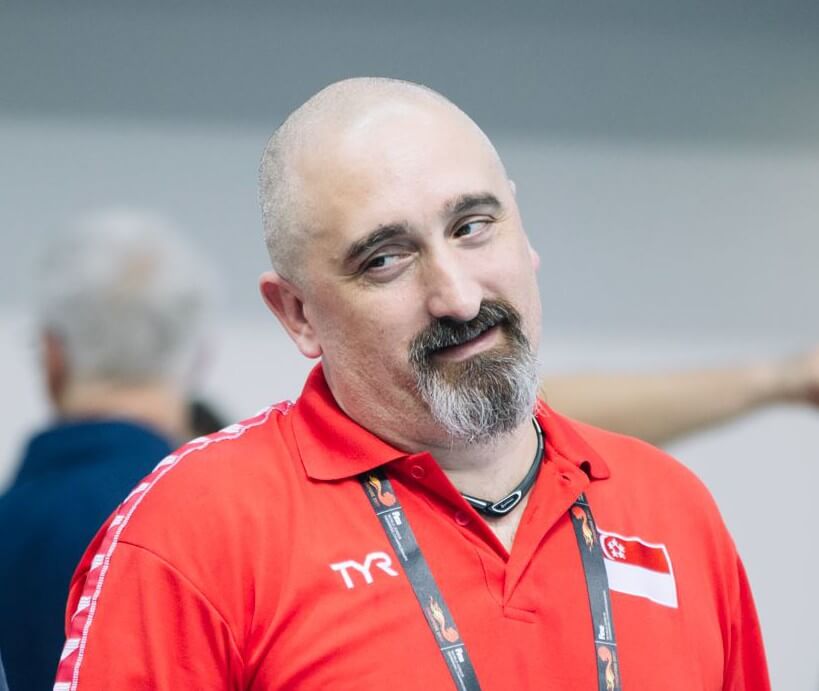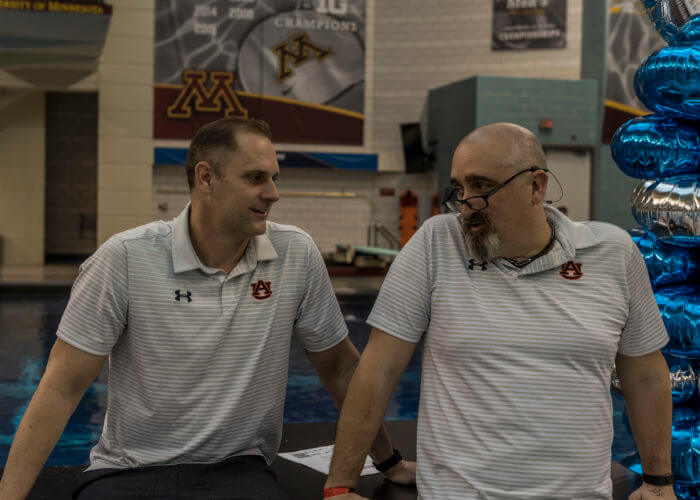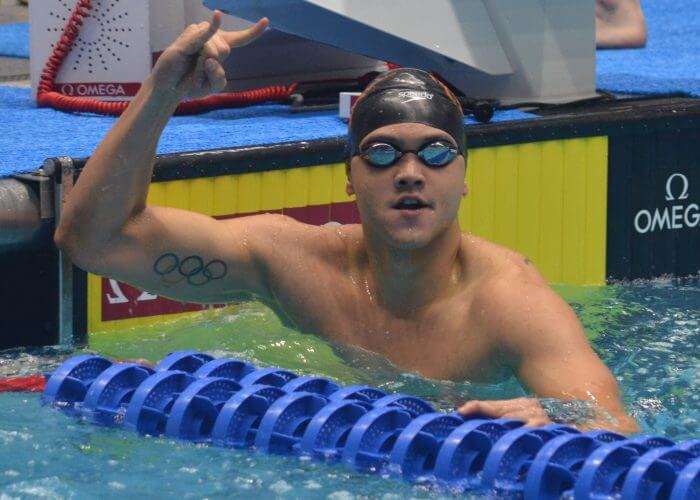Champion’s Mojo Podcast: Sergio Lopez on Harnessing the Mind

An elite swim coach at Virginia Tech and Olympic medalist, Sergio Lopez Miro joined the Champion’s Mojo podcast to talk about the power of harnessing the mind and chasing authenticity, and how he uses those targets as part of his winning mentality.
Below is an abridged Q&A of the interview, conducted by Kelly Palace and Maria Parker, with Sergio Lopez Miro. You can listen to the full podcast episode #56 at https://championsmojo.com or by clicking here.
Champion’s Mojo: Tell us about what’s going on at Virginia Tech.
Sergio Lopez Miro: I think it’s going pretty well. I think my attitude has always been to look at the positives of the negatives and that’s what we’re trying to do right now. I think we have a very good president and leadership. We’ve been able to have a consistent training system. We’ve been able to do a very good job with recruiting. We thought that was going to be hard. It’s hard because the kids can’t come. They can choose to come with their parents, but we haven’t been able to see them or anything. We’ve still gotten some huge commitments. I think making positives out of the negatives has worked very well for us and I think we’re slowly taking steps forward.
Champion’s Mojo: What defines good leadership for you?
Sergio Lopez Miro: Well, I think the bottom line is, and this may be cliche, being able to empower people to be the best they can be. As the head coach, with your assistants, you want to have people who are better than you, or they want to do things you may not want to do. You empower them to do that. I think that filters down to the team. Even though our job is to win, it’s also to help them to understand their talent. I think what we do is fight to empower them to feel that power. That energy is going to make you successful as a swimmer or a parent or a janitor or an engineer. That’s why I think you need to empower them to be the best that they can be.
Champion’s Mojo: How did you learn that?
Sergio Lopez Miro: Well, I think it comes back to when I was a kid. I grew up in a dictatorship in Spain. We had a 40 year dictatorship and I was in the last 10 years of it. I’m Catalan. I speak Catalan, but I wasn’t allowed to speak outside of the house. There were a lot of things going on before we transitioned into a democracy. I think everything boils down to the fact my father left us when I was three years old. I was in a Cathlolic society where everyone lives together. One woman didn’t really have working power, so my mom was left with the kids. My mom is the best example that I have in my life. She wasn’t at home because she was always working. She had two or three jobs to pay for the debt and to put us through school. I grew up on the streets in Barcelona. I spent a lot of time in the streets wondering where my life was going. I think that made me understand the power that swimming gave me. I was never a very good swimmer growing up. I was always in the top three from the bottom. I always loved to train. I think swimming was what made me understand how powerful I was as a person. I became good around the age of 17 and that’s when things changed big time for me with my swimming scenario. When I was a kid, I always wanted to be a coach because even though I wanted to be an Olympic champion, it was very far fetched. I couldn’t even qualify for Nationals. So, instead, I wanted to coach an Olympic champion. I want to help people understand how powerful swimming made me feel internally because it’s a gift that we have. We have so many talents that they get diluted and, whoever has been swimming for many years, understands that telent. The talent isn’t that they are going to be an Olympic champion, it’s that you can be happy and feel internal success and learn to feel that in school or other places.
Champion’s Mojo: You didn’t become a talented swimmer until you were 17 or 18. What did you do to keep yourself motivated to stay in the game so you could achieve that success?
Sergio Lopez Miro: Well, I probably cried a lot. I honestly don’t know. My mom told me when I was 28 years old and had retired as an athlete and had returned to Spain to work. I didn’t like the way Spain was going so I decided to sell my house and come to America to start coaching. I spent a month and a half in my mom’s house and I was very sad, very depressed, because, for the first time in my life, I felt that I had no idea what I was going to do. My mom has always been my example of working hard. She asked me one day why I was so sad. You always have a home here with me. You can be 50 years old and this is still your home. After living in America, you don’t think that way anymore. Once you’re a teen, you leave the house. She told me that if I train hard, and go to a meet and swim badly, I would cry for five minutes and be back in the pool the next day to train. She told me that I had taught her how to never give up. Because she saw that, even if I wasn’t getting what I wanted, I was back the next day working again.
Champion’s Mojo: What was your mindset when you broke your leg at the women’s ACC Championship meet and continued to be on deck coaching?
Sergio Lopez Miro: I guess I broke it pretty well because they had to put five screws and a plate in my leg. What happened was very simple. On the last day of the women’s meet, we were walking in for the mile. I was just walking in front of the girls and I slipped and did a full split. My ankle went under my leg, and my body went under my ankle. At that point I was 270 pounds of pure love and it cracked it. I thought it was ok and we didn’t know if it was broken or not, so I just stayed there for that session. My wife drove up and took me to the emergency room on Sunday. We went to a couple places and they told me I was going to have to have surgery because it was broken. I could have gone home, but I felt I needed to stay there. The kids worked so hard. I don’t like medication, so I didn’t take any pain medicine. I went through the meet fine, though it was hard because I couldn’t move. The fact that the athletes could see me there, let them know that they can do anything. A few weeks later I came back and got surgery.
Champion’s Mojo: Do you make use of meditation of visualization?

Photo Courtesy: Peter H. Bick
Sergio Lopez Miro: We do a lot of meditation and visualization. If you go to my YouTube channel you can see a few of them. Since I was a kid I did a lot of it. As a kid, I was visualizing that I was the best in the world. In 1987 I was driving my motorcycle into Barcelona when I was hit by a car. I was going about 80 miles per hour and woke up five hours later in the hospital with a broken scapula. This was in the beginning of June and I had the European Championships in August. I asked the doctor if I was going to be able to compete and he told me no way, I was going to have to be in a cast for two or three months. By the time I was out of the cast there was going to be a lot of atrophy in the muscles and nerves. She took me to a different doctor who said the same thing, but who suggested a different cast that wouldn’t cause as much atrophy but would require me to come in once a week. I started doing visualization. One of the things I visualized was almost welding my scapula back together. The other was my best race. My best time was 2:19, and I was working towards a 2:16.5. I visualized that race. The blocks. Getting the splits that I wanted. Four weeks into recovery I went into my doctor and I told him I could feel something. They took an X-Ray and said I was fine. I told the swimming federation that I wanted to go to the European Championships. They said if, in two weeks, I could go 2:20 at the regional championships, they’d take me. I went to the meet and went a 2:20. I went to the European Championships and went 2:16.51, the exact time I was visualizing. I’ve always done visualization, and we do a lot of it with my team. Visualizing moving through the pool and controlling their energy. Some of them might think I’m crazy. I think things are a self-fulfilling prophecy. If you think about getting sick, you’re going to get sick. When I broke my ankle, I did a lot of breathing exercises. I’m not a very strong person, but that helped the pain.
Champion’s Mojo: What other tricks do you use with your athletes?
Sergio Lopez Miro: I used to coach Matt Grevers when I was at Northwestern. With people like that, if you get them to buy into underwater meditation or something like that, you can see the best possible outcomes. You have all these coaches and biomechanics, but if you calm someone’s mind down so that they can move through the water and feel it better, they’re going to do well. I really think that’s the key. Sometimes we worry too much about swimming fast and pushing them to be strong. This year, I had a post-grad kid that came to train with me. I wasn’t saying anything, just watching. After a few weeks he goes up to one of the other coaches and asks why I wasn’t correcting his stroke. He told him that I wasn’t going to correct his stroke until I understood how he moved through the water. It doesn’t make sense to tell someone to catch the water this way if you can’t feel it. That’s the way I coach.
Champion’s Mojo: What do you see as a commonality amongst champions? What do you see as a commonality among the best?

Photo Courtesy: Dan D’Addona
Sergio Lopez Miro: They hate to lose. Some of them have a very dark side, but we all have a dark side. They can be very dark and harsh. That’s not a negative thing like most people think. It’s a positive thing. You can embrace it. A lot of them are selfish. Driven. They hate to lose. They can even come across as bad people. But that’s because of the drive that they have. We talk about mental health issues nowadays more than ever before. We can name so many world class athletes who have struggled because they’ve lost that ability. It can be very volatile if they are that driven. People like Kevin Cordes, Ryan Murphy, Santo Condorelli, all of these guys. Even Caeleb Dressel. All of these people have a hard side. Joseph Schooling, who’s training with me right now, has been with me for countless years. When he came to Bolles, the goal was that he would be an Olympic champion. I was trying to create a product, for lack of other words, to take him and countless others to a different level. When I started working with him, I told him he needed to realize certain things. Not just for swimming, but for his own life. He gets a lot of criticism because he’s not swimming as fast as he once did. He has countless people, possibly more than (Michael) Phelps, in Southeast Asia who idolize him. When you lose ownership of who you are at that level it’s so hard. You have to learn to ground yourself again. He gave up living in Singapore to move to Blacksburg to work with me. All these athletes are great people with amazing hearts, but they have to work through internal things. If any coach were to write a book or something on the internal workings of these athletes, it would be an amazing read because there’s some very interesting stuff.
Champion’s Mojo: What advice would you give to someone who is struggling with the uncertainty of the future right now?
Sergio Lopez Miro: I think the advice would be that the future isn’t uncertain. It’s as simple as we’re born, we live, and we die. Life is much more simple than we make it. Yes, the fact that you may not go to the Olympics is disappointing, but you had an amazing career and a beautiful life ahead of you. If your life only lasts one more year because the world disappears, then make the best of it. If you’re going to have a wedding and that can’t happen, if you’re truly in love with your partner, do you think that really matters? You’re going to be with that person for your life. Who cares about postponing it. You can’t have Christmas with your parents or family. Most of our foreign athletes didn’t travel home because they didn’t want to risk having to quarantine. There’s going to be many more Christmases. Be positive. Look at the good you have in your life and keep plodding along.
Champion’s Mojo: What makes a champion in life?
Sergio Lopez Miro: We live in a society that is all about perception. Parents want their kid at the best school and everyone wants the best this and that. We need to learn to understand that success is a state of mind. I’ve been with my wife for 30 years, but when I go to bed, I’m alone. When I close my eyes, I’m alone. I always wanted to win an NCAA Championship with a team, but if I quit coaching today I would be ok. I think that’s the bottom line. Success is a state of mind. If you worked very hard for something you can cry for five minutes, make the best of your situation, and keep moving on.
Champion’s Mojo: Is there anything we haven’t talked about today that you would like to share with our listeners?
Sergio Lopez Miro: For the parents that are listening, make sure to not live your dreams through your kids. Empower them to be the best they can be. You have to give them honest, unconditional love. That’s an important thing. Even though I was a menace to society as a child, my mom always told me that children come into the world to teach parents about themselves. You see yourself in your children. My children won’t go through the same pain that I did. You have to love your children unconditionally. For the athletes, never give up. Stay the course. You will know at the end if it was meant to be or not. At the end of the day, life goes on. When you’re my age, that’s not what matters. If you ask me about my Olympic medal, I can’t tell you where in my house it is. Work as hard as you can and be honest. If your 100% is only a 7, then give that. If it’s only a 5 then give that. Giving 100% is always the best that you can do.
Champion’s Mojo: Thank you so much for spending this time with us today!
Sergio Lopez Miro: I’m happy to do it! Thank you!



